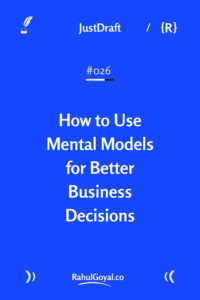5 Best Mental Models That Improve Decision Making
Ever feel stuck when making a tough decision? The world’s top leaders—Elon Musk, Jeff Bezos, and Steve Jobs—don’t just work harder. They think smarter. Their secret? Mental models.
Mental models are like tools for your brain. They help you understand the world, solve problems, and make better choices. Think of them as shortcuts that simplify complex ideas. Once you start using them, you’ll see things more clearly and make faster, smarter decisions.
One Topic: The Power of Mental Model
Here are five powerful mental models you can use right now:
1. Parkinson’s Law – Work expands to fill the time available.
It means, if you have a long deadline, you’ll take the full time, even if the task doesn’t need it. More time often leads to procrastination.
Example: Some leaders schedules meetings in 5-minute blocks to stay focused and avoid wasted time.
Give yourself half the time you think you need for a task and see how much more efficient you become.
Why Parkinson’s Law Works:
- When you have less time, you naturally cut distractions.
- You focus on what actually matters instead of overcomplicating things.
- It forces you to be decisive and act quickly.
2. Occam’s Razor – The simplest solution is usually the best.
When you have multiple solutions, the one with the fewest steps is often correct.
Example: Steve Jobs designed the iPhone with just one button to make it simple and easy to use.
When you stuck on a problem, ask: “What’s the simplest way to solve this?”
What makes Occam’s Razor unique:
- Complex solutions often introduce more errors.
- The simplest solution is easier to communicate and implement.
- It helps eliminate unnecessary details and keeps things clear.
3. Survivorship Bias – We focus on winners and ignore failures.
People only look at successful examples and forget all the failures behind them. For every success story you admire, find three failures to get a full picture of what works and what doesn’t.
Why Survivorship Bias Works:
- It stops you from blindly following trends that might not work.
- Learning from failure prevents repeating the same mistakes.
- It gives a more realistic view of what success actually takes.
4. The Pygmalion Effect – People live up to the expectations you set.
If you believe in someone’s potential, they are more likely to succeed. High expectations lead to high performance. Example: When Satya Nadella became CEO of Microsoft, he told his team they were innovators. That belief helped Microsoft’s stock triple in value. Encourage people around you. Call your team “rockstars” and see how their performance improves.
Why Pygmalion Effect Works:
- People respond to positive reinforcement.
- Confidence leads to greater effort and results.
- A culture of high expectations creates high achievers.
5. Second-Order Thinking – Always ask: “And then what?”
Don’t just think about the immediate result—think about what happens next. Before making a big decision, write down three possible long-term effects.
Why Second-Order Thinking Works:
- It helps you avoid short-term thinking that could backfire later.
- You make more informed, strategic choices.
- It reduces the chances of unexpected negative consequences.
Why Mental Models Is Successful
Mental models train your brain to make smarter choices.
- Avoid overthinking—no more getting stuck in endless decisions.
- Spot patterns others miss—see opportunities and risks more clearly.
- Make confident choices—trust yourself and move forward faster.
Using mental models helps you think better, make sharper decisions, and become a better leader over time.
How you can start and use Power of Mental Models
- Pick one mental model this week and try using it in daily life.
- Keep a list of mental models that work best for you.
- Share one mental model with a friend or coworker and see how they use it.
Great leaders don’t just react—they think in frameworks. Mental models help you make sense of the world, solve problems, and make better decisions. Start using them today!
Read last week’s JustDraft newsletter about 5S Method or System from Japan.
Two Quotes
Your mind is your greatest asset. Train it well.
Clear thinking requires courage rather than intelligence.
One Passage From A Book
We’re blind to our blindness. We have little idea how little we know. We’re not designed to judge ourselves accurately. System 1 (intuition) loves patterns, but only System 2 (logic) can question them. Train both.
📚From Thinking, Fast and Slow by Daniel Kahneman

